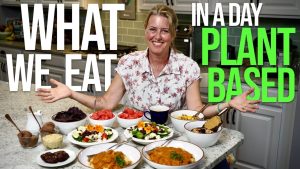
Introduction
In 2025, health-conscious eating is more popular than ever. As people become more aware of the importance of nutrition, sustainability, and well-being, many are making mindful food choices. The food trends in 2025 focus not only on nutritious options but also on eco-friendly foods and sustainable eating practices.
From plant-based foods to superfoods and functional foods, the food industry is adapting to meet these needs. Whether you’re already following a vegan diet or want to make healthier choices for your health and the environment, the trends in 2025 are exciting and beneficial for your well-being.
In this article, we’ll explore the top food trends in 2025 that health-conscious individuals are adopting and how they contribute to better health and a more sustainable food system.
What Are the Top Food Trends in 2025?

1. Plant-Based Eating
Plant-based eating continues to grow in popularity in 2025. More people are embracing plant-based diets for health, ethical, and environmental reasons. Plant-based foods are rich in nutrients, offer a wide variety of flavors, and have health benefits, including lowering the risk of heart disease, obesity, and type 2 diabetes.
Plant-based eating includes everything from vegan diets to vegetarian options. It’s not just about avoiding animal products—there are delicious plant-based burgers, cheeses, milks, and even ice creams. These alternatives are becoming tastier and more accessible, and they also have a smaller environmental impact.
2. Superfoods for Better Health
Superfoods are nutrient-packed foods that offer exceptional health benefits. In 2025, people continue to embrace superfoods as a way to boost immunity, improve energy, and enhance overall well-being.
Popular superfoods in 2025 include chia seeds, spirulina, acai berries, turmeric, and matcha. These foods are full of antioxidants, vitamins, and minerals that support immune health, digestion, and reduce inflammation. Superfoods are easy to include in meals, whether in smoothies, snacks, or supplements.
3. Functional Foods for Enhanced Well-Being
Functional foods are foods that provide benefits beyond basic nutrition. These foods are designed to support specific health needs like boosting immunity, improving gut health, and enhancing brain function.
Examples include foods enriched with probiotics and prebiotics for digestion, adaptogens like ashwagandha and maca for stress relief, and omega-3-rich foods like flaxseeds and chia seeds for heart health. These foods are becoming more common in health-conscious diets.
4. Sustainable Eating
Sustainable eating is increasingly important in 2025. As concerns about climate change, pollution, and food waste grow, more people are making conscious decisions about how their food is produced and sourced. Sustainable eating focuses on choosing foods that have a lower environmental impact.
This includes choosing locally sourced produce, supporting ethical farming practices, and reducing food waste. Many people are opting for organic, seasonal foods that use minimal packaging, contributing to more sustainable eating habits.
5. Mindful Eating and Clean Eating Practices
In 2025, people are embracing mindful and clean eating practices. Mindful eating involves paying attention to how and what you eat, savoring each bite, and understanding how food makes you feel. This practice promotes a healthier relationship with food, reduces overeating, and improves digestion.
Clean eating focuses on consuming whole, unprocessed foods like fruits, vegetables, whole grains, and lean proteins. People are avoiding heavily processed foods high in sugars and unhealthy fats and instead focusing on nutrient-dense foods that nourish the body.
6. Vegan and Dairy-Free Alternatives
As more people choose plant-based diets, there’s a growing demand for vegan and dairy-free alternatives. In 2025, options like almond, oat, and coconut milk are mainstream, and vegan cheeses and plant-based meats are widely available.
These alternatives are not only better for the environment but also offer health benefits, such as lowering cholesterol, improving gut health, and supporting weight management. With more options available, it’s easier to make healthy, plant-based choices.
How Technology Is Shaping Health-Conscious Eating

Technology is playing a major role in how people eat. From apps that track food intake to smart kitchen appliances, technology helps people make healthier decisions.
Nutrition-tracking apps help monitor calorie intake, nutrient balance, and healthy food choices. Smart kitchen devices like air fryers, pressure cookers, and meal planning apps make it easier to prepare healthy meals quickly. These tools help health-conscious individuals stay on track with their goals.
Tips for Embracing Health-Conscious Eating in 2025

- Start Slow: Gradually transition to a plant-based or sustainable diet. Begin by replacing one or two meals per week with plant-based options, and increase your intake of whole foods.
- Educate Yourself: Stay informed about the latest food trends. Learn about the benefits of superfoods, functional foods, and sustainable options.
- Cook at Home: Preparing meals yourself gives you control over ingredients and portion sizes. It’s also a chance to try new plant-based recipes and superfoods.
- Choose Local and Seasonal: Support sustainable farming practices by opting for locally grown and seasonal produce. This ensures fresh, nutrient-dense food.
Challenges of Health-Conscious Food Trends
While health-conscious food trends have many advantages, they also come with challenges. One of the main difficulties is the cost plant-based, organic, and specialty health foods can be more expensive than traditional options, making it harder for some consumers to access these products. There is also the challenge of availability, as not all grocery stores or restaurants offer a wide variety of healthy, sustainable food choices. Additionally, some people may find it difficult to transition to new diets or may struggle to find meals that meet their specific health needs. Despite these challenges, the growing popularity of health-conscious eating is pushing the food industry to evolve and provide more options for consumers.
The Future of Food Trends in 2025 and Beyond

The future of food trends in 2025 looks exciting, with more people prioritizing their health and well-being. As consumers continue to seek healthier options, the demand for plant-based, organic, and functional foods will likely increase. Advances in food technology will also bring innovations like lab-grown meat and personalized nutrition, making it easier for people to meet their specific dietary needs. As sustainability becomes an even greater priority, we can expect more eco-friendly packaging, local sourcing, and waste reduction practices in the food industry. In the years to come, health-conscious food trends will continue to shape the way we eat, making healthy, sustainable food choices more accessible and mainstream for everyone.
Comparative Table: Popular Health-Conscious Food Trends in 2025
| Food Trend | Description | Examples |
|---|---|---|
| Plant-Based Eating | Focus on vegan and vegetarian diets | Vegan burgers, plant-based milk, meat substitutes |
| Superfoods | Nutrient-rich foods with health benefits | Kale, chia seeds, acai berries, turmeric |
| Functional Foods | Foods that provide additional health benefits | Kombucha, kefir, adaptogenic herbs, omega-3 foods |
| Sustainable Eating | Foods that minimize environmental impact | Organic produce, locally sourced foods |
| Mindful & Clean Eating | Focus on whole, unprocessed foods with mindful eating | Whole grains, fresh fruits, vegetables |
Conclusion: Eat Well, Live Well in 2025
Food trends in 2025 emphasize health-conscious eating that prioritizes sustainability, nutrition, and mindfulness. Whether you’re choosing plant-based options, exploring functional foods, or focusing on clean eating, the key is making informed, conscious choices. These trends are beneficial not only for your health but also for the planet.
Call to Action
Ready to make healthier choices in 2025? Start by exploring plant-based options, trying out superfoods, and adopting sustainable eating habits today. Your body and the planet will thank you!










